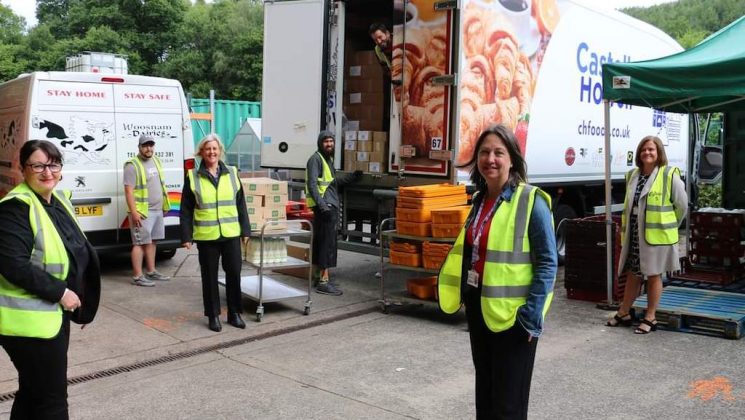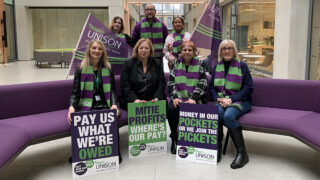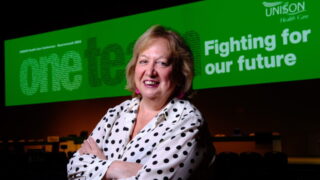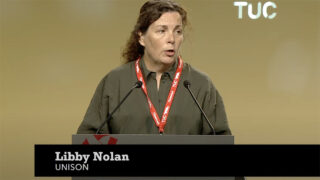Marcia Lewis (third from left) and council colleagues in their ‘packing and distribution centre’ for free school meals – in a car park at the back of council offices
The time is long gone when talk of school closures was a source of mirth, when snow days and burst water mains caused headaches for staff and parents but unparalleled delight for pupils.
Now, after schools have been closed for months through the COVID-19 pandemic and with the continuing exam result fiascos dominating headlines, the topic is spoken of in much more serious tones.
For many children, school doesn’t just represent a place of education. In normal times, the free school meals scheme provides around 1.4m children from low-income families in the UK with regular, nutritious meals free of charge; for some, it is the only substantial meal they’ll get that day.
The free school meals scheme was catapulted into the national headlines during lockdown, when a campaign spearheaded by the footballer Marcus Rashford – who gave a heartfelt account of how it had benefitted him as a child – successfully forced a U-turn from the Westminster government and a commitment to extend the scheme through the summer.
The Welsh government had agreed an extension months earlier. At that point many children weren’t receiving meals, but vouchers.
Shut down
When it was announced on Wednesday 18 March that schools would not reopen in England and Wales the next week, authorities faced the daunting proposition of having just five days to work out how to provide thousands of ‘school meals’ without the canteens to serve them in.
Many elected to go with the alternatives sanctioned by the government, including supermarket vouchers, viewing them as the only viable option.
But there were various concerns about the vouchers, worth between £15-20 a week, including the range of shops they could be used in, the risk of incentivising people to leave their homes to buy food during lockdown, and the fact that it was impossible to ensure that the money was being spent on quality meals for the children.
So Caerphilly County Borough Council came up with a different answer.
Meals on some new wheels
By Monday, they had prepared just over 2,500 packed lunches for collection and, a week after that, they had prepared and were ready to deliver around 4,000 meal boxes, with five nutritious frozen meals in each, to the doors of low-income families.
How did they achieve this?
“It was the comradeship from all the teams across the council, as well as the belief from senior management team that it could be undertaken and delivered,” says Marcia Lewis, a longstanding UNISON member and principal officer for catering at Caerphilly Council.
In those first few days, she and her team prepared the proposal not to go to a voucher system, but to take on the challenge to keep providing healthy, nutritious meals to the pupils who were eligible for free school meals.
The week of packed lunch collections – no small feat itself – provided a stopgap for Marcia and her team to work closely with local suppliers and examine exactly what was feasible to provide for the week after.
Made even more difficult by the ever-changing guidelines and laws around Coronavirus in the early days of lockdown, they designed a ground-up system, from procurement to preparation to delivery, to be able to provide over 4,000 frozen meal boxes for the following week.
With the plan in place and management in full support, Marcia organised and oversaw the setup of an industrial-scale packing and distribution centre in a car park at the back of a set of council offices. Employees from teams across the authority stepped up to pack meals, fill vans, drive them and process new applications.
Helping the local economy
“The staff have really shone,” says Marcia, “volunteering and putting their name forward. From trading standards, housing, health and safety, the receptionists. The commitment they’ve all given, working in all weather, has been amazing.
“It’s been an immense task, but I think it’s been really rewarding for a lot of them – it’s a completely different role to what they’re used to.”
On the impact they were having, Marcia says: “From some of the phone calls we were getting, you realise that this was the only food coming into the house.
“Sometimes you forget how important that school meal is for many individuals, it could be the only meal the children get.”
The school meals weren’t just important for the children. By using local suppliers wherever possible, it provided a vital source of income for local businesses. Many have said that, without that, they would have had to furlough more staff, and some may have struggled to stay afloat through lockdown.
In the third week after schools closed, the food packages contained bread and milk; by weeks four and five, they included fresh fruit and veg, and desserts. The fruit and veg was particularly well received, as they were paired with recipe idea cards to encourage children and parents to cook together with the fresh produce provided.
A real community spirit developed around the project. Suppliers appreciated the lifeline and pulled together to help in whatever ways they were able. Take-up among those eligible for the meals rose from 70% to 91% with numbers peaking at 5,200 pupils provided for in a week, over 25,000 meals.
UNISON Caerphilly branch secretary Lianne Dallimore couldn’t be prouder of her council and UNISON’s members.
“A number of our members were involved in this service and have demonstrated a level of dedication that has been unfaltering – they’ve banded together, rolled up their sleeves and got stuck in.”
‘True public sector spirit in action’
Wales has been hit hard by 10 years of Tory austerity, with almost 28,000 job losses across local authorities that, without further funding from central government, could see more cuts in the coming years due to increased expenditures during the crisis and a sharp downturn in incomes over the same time.
“Just think what difference it would have made to the people of Wales,” says Lianne, “if they hadn’t had those people to call on during COVID-19 – how many families wouldn’t have been supported, how many children wouldn’t have been fed?
“This is true public sector spirit in action, a spirit which this country cannot afford to see disappear – especially at a time like this.
“We need public services now more than ever and we can’t afford to see them slowly dismantled, service by service, or commissioned out under the guise of the ‘new normal’. There’s nothing ‘new’ about old Tory tactics.”
So far, Caerphilly County Borough Council has delivered 675,000 meals, 135,000 loaves of bread and 481,100 pieces of fruit and veg, with 25,000 meals still being delivered weekly.
Lianne reflects: “The free schools meals service has been a huge success for Caerphilly and has shown just what the public sector can achieve. The private sector couldn’t and wouldn’t have stepped up the way our public sector workforce has.”
With schools scheduled to reopen in Wales on 14 September, the scheme will remain in place until 30 September to provide a chance for schools to get the catering systems right for a return to some semblance of normality.
After being inundated with grateful messages, Marcia notes: “The biggest reward of all was the feedback from the community that Caerphilly had got it right.”







One thought on “Keeping Caerphilly schoolchildren fed during COVID”